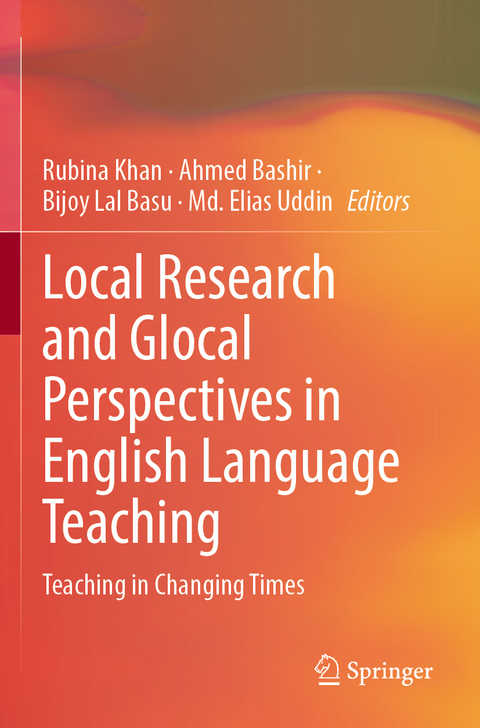
Local Research and Glocal Perspectives in English Language Teaching
Springer Verlag, Singapore
978-981-19-6460-2 (ISBN)
Rubina Khan is Professor at the Department of English, University of Dhaka, Bangladesh. She has a Ph.D. in English Language Teaching (ELT) from the University of Warwick, and an MA in TESOL from the University of Northern Iowa, USA. With experience in teaching, research, and assessment, she has published extensively and presented at national and international forums. Her current areas of interest include teacher professional development and leadership skills. She is President of the Bangladesh English Language Teachers Association (BELTA). Ahmed Bashir is Professor at the Department of English, University of Dhaka, Bangladesh. He has an MA in Applied Linguistics & English Language Teaching (ELT) from the University of Dhaka, and a second MA in TESOL from the University of Nottingham, Malaysia Campus. His areas of interests include language learning/teaching strategies, learner autonomy, educational technology, and language testing and assessment. He is theGeneral Secretary of the Bangladesh English Language Teachers Association (BELTA). Bijoy Lal Basu is Associate Professor at the Department of English, University of Dhaka, Bangladesh. He has a PhD in Curriculum and Pedagogy from King’s College London and an MA in TESOL from the UCL Institute of Education. He has co-authored Endeavour: An introductory language coursebook (2014) and published articles in journals including TESL EJ and Asia TEFL. His research interests include ELT curriculum and pedagogy, teacher education, pragmatics and discourse studies. Md. Elias Uddin is Assistant Professor at the Department of English, University of Dhaka, Bangladesh. He has an MA in Applied Linguistics and English Language Teaching (ELT) from the University of Dhaka. His areas of interest include educational assessment, materials design and development, and teacher education.
Introduction.- Part 1: Socio-cultural perspectives in ELT.- ELT and development in Bangladesh: A critical overview.- Students' uptake of translanguaging pedagogies and translanguaging-oriented assessment in an ELT classroom at a Bangladeshi university.- Culture in language teacher education: A South Asian perspective.- Snowflakes versus ice cubes in creative language use.- Part 2: Curriculum and materials.- Economisation of the secondary English curriculum in Bangladesh.- Outcome-based living ELT curriculum in higher education in Bangladesh.- Enacted curriculum of private English kindergartens in Korea: Cases of three play-based English kindergartens in Seoul.- “Stories About Ourselves”: Collaboration, teacher development, and creating culturally relevant graded EFL reading materials for Bangladeshi learners.- The challenges of developing ELT materials for higher secondary schools in Bangladesh: The case of the English textbook.- Rhizomatic literacy through graphic novels.- Part 3: Educational technology.- Students’ evolved beliefs of TELL constraints and benefits: Learner voices from an EAP programme.- Teacher initiatives for technology integration in higher education in Bangladesh.- Wiki-based collaborative writing: Undergraduate learners’ perspectives.- Using digital tools to enhance student engagement in online learning: An action research study.- Part 4: ELT practices.- Re-envisioning English language teaching in a post-COVID world: Using language education for sustainable development.- Exploring language learning attitudes through diaries.- Second language writing instruction in Iran: The status quo and future research agenda.- Impact of textual enhancement on EFL learners’ noticing and acquisition of noun and verb phrases.- Disruptive perspectives and reinvention: Why and how for the English learners.- Part 5: Assessment.- Practical applications of learning-oriented assessment (LOA).- Exploring assessment literacy of tertiary-level teachers in Bangladesh.- Impact of a national English as a foreign language test on parents in Nepal.- Common item violations in multiple choice questions in Bangladeshi recruitment tests.- Part 6: Teacher education.- Researching and developing teacher expertise in the Global South: Local and transferrable solutions.- The professional, pedagogical, and personal impacts of being a volunteer teacher trainer: Case studies from teachers helping teachers.- English language teacher education and policy changes in multilingual Indonesia.- “Not Proper Teaching”: The beliefs and experiences of novice native English language teachers in the UK.- (Re)thinking initial teacher education curriculum: Towards equitable, crisis-ready TESOL.- Closing thoughts.
| Erscheinungsdatum | 11.01.2024 |
|---|---|
| Zusatzinfo | 8 Illustrations, color; 14 Illustrations, black and white; XVII, 479 p. 22 illus., 8 illus. in color. |
| Verlagsort | Singapore |
| Sprache | englisch |
| Maße | 155 x 235 mm |
| Themenwelt | Schulbuch / Wörterbuch ► Wörterbuch / Fremdsprachen |
| Geisteswissenschaften ► Sprach- / Literaturwissenschaft ► Sprachwissenschaft | |
| Sozialwissenschaften ► Pädagogik ► Schulpädagogik / Grundschule | |
| Schlagworte | assessment for learning • assessment literacy • Collaborative Writing • cultural relevance • Curriculum Implementation Strategies • Economisation of Education • ELT and Development • ELT Curriculum Change • English and Globalisation • English for Employment • MCQ Item Violation • National Curriculum Framework in Bangladesh • post-COVID curriculum • Reform Message • Teacher development • Teaching Vocabulary • Tech-enhanced Pedagogy • technology integration • Translanguaging Pedagogies • Volunteer Teacher Trainers |
| ISBN-10 | 981-19-6460-2 / 9811964602 |
| ISBN-13 | 978-981-19-6460-2 / 9789811964602 |
| Zustand | Neuware |
| Haben Sie eine Frage zum Produkt? |
aus dem Bereich


